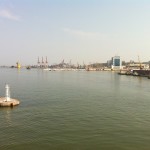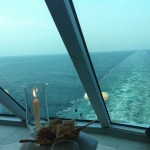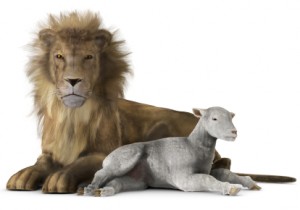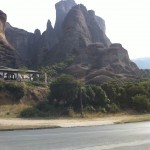
Today we made our first stop in Greece. Volos, Greece. We didn’t stay there long but instead hopped on a bus early in the morning and headed 2 hours into the interior of Greece to a place called Meteora.
The Greek countryside, at least the part we saw, is abundantly populated with mountains separated by large flat plains, carved up into geometrically portioned plots that are cultivated with various crops. There is very little wasted land, though the people one would expect were necessary to work the land seemed scarce.
The absence of people living in the country surprised me because I thought, apparently wrongly, that a people with such a long and rich history of advanced civilization (3,000 years) would have densely populated the country by now. It was only later I learned the population of Greece is only about 11,000,000 and that one third live in Athens.
Meteora is a group of monasteries built precariously on the top of mountains. I don’t know whether to call them mountains or rocks because their odd shapes resemble large stone stakes driven into the ground. The monasteries are perched on top of them.
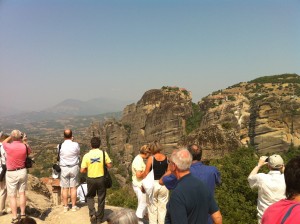
The pictures I took really do not do them justice; one can’t appreciate the height of the mountains or the precariousness of the structures on top of them. I’ve provided links to other photos that are actually better.
Photos inside the churches were not allowed, although some tourists took that more as a suggestion than a prohibition. I’d blame it on a language barrier except that a drawing of a camera with an X marked over it pretty much communicates the idea in any language.
In any event, I can only describe for you the ornate carvings and paintings that covered every square inch of the walls and ceilings. Of the churches we’ve seen on this trip, the paintings in these two basilicas (the basilicas at St. Stephen and St. Barbara) were unique in their emphasis on and graphic depiction of the fate of Christian martyrs.
The paintings portrayed torture, dismemberment and beheadings of Christians throughout history in a graphic, gory detail that leaves a clear imprint on one’s mind and imagination. I suspect this was the intent. I’ve always wondered why American clergy don’t remind their congregations more of the sacrifices of the martyrs. Their sacrifice has done more to advance the kingdom of God on earth than a multitude of sermons and teachings. GS

